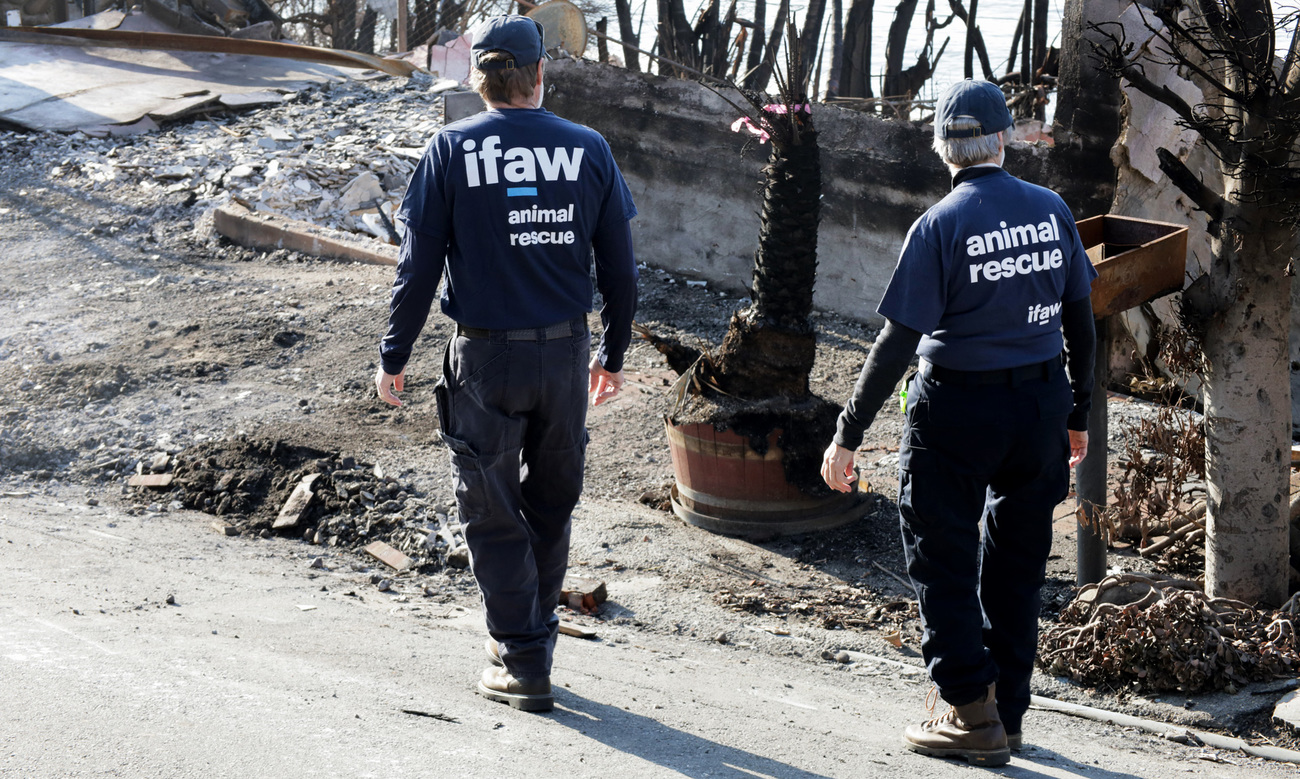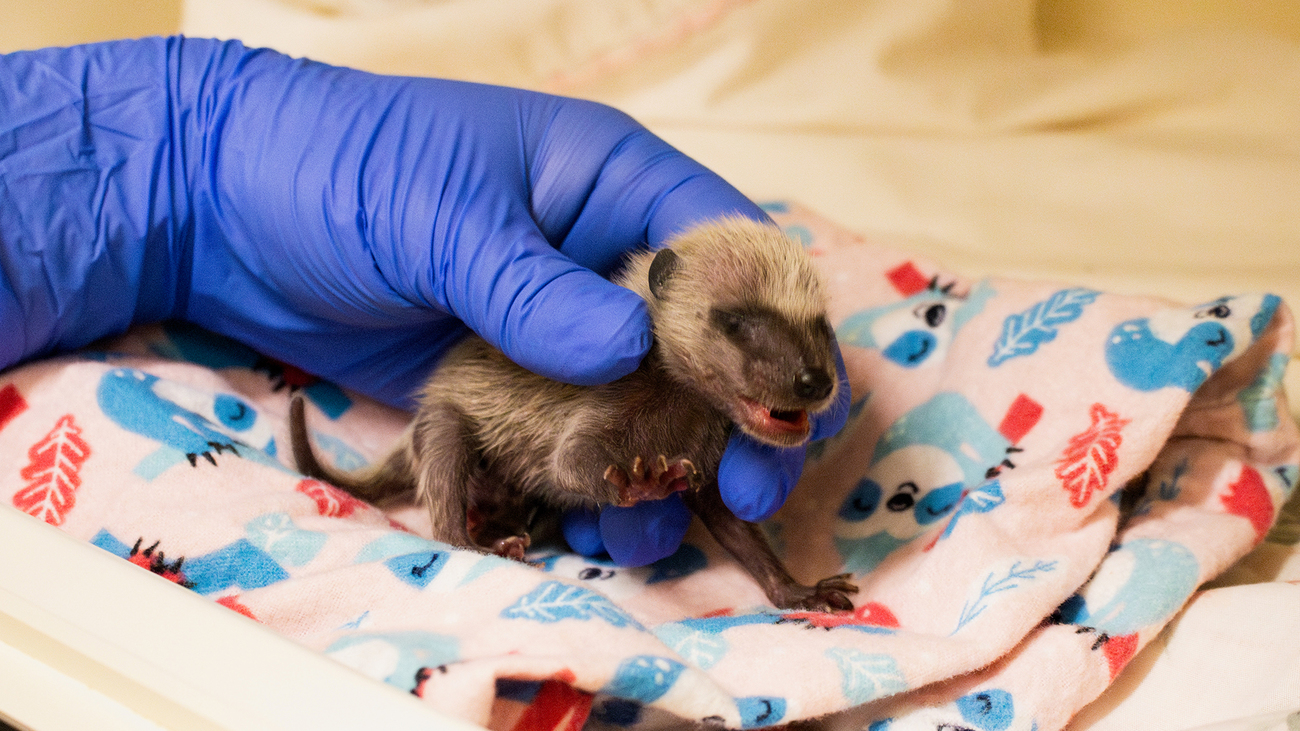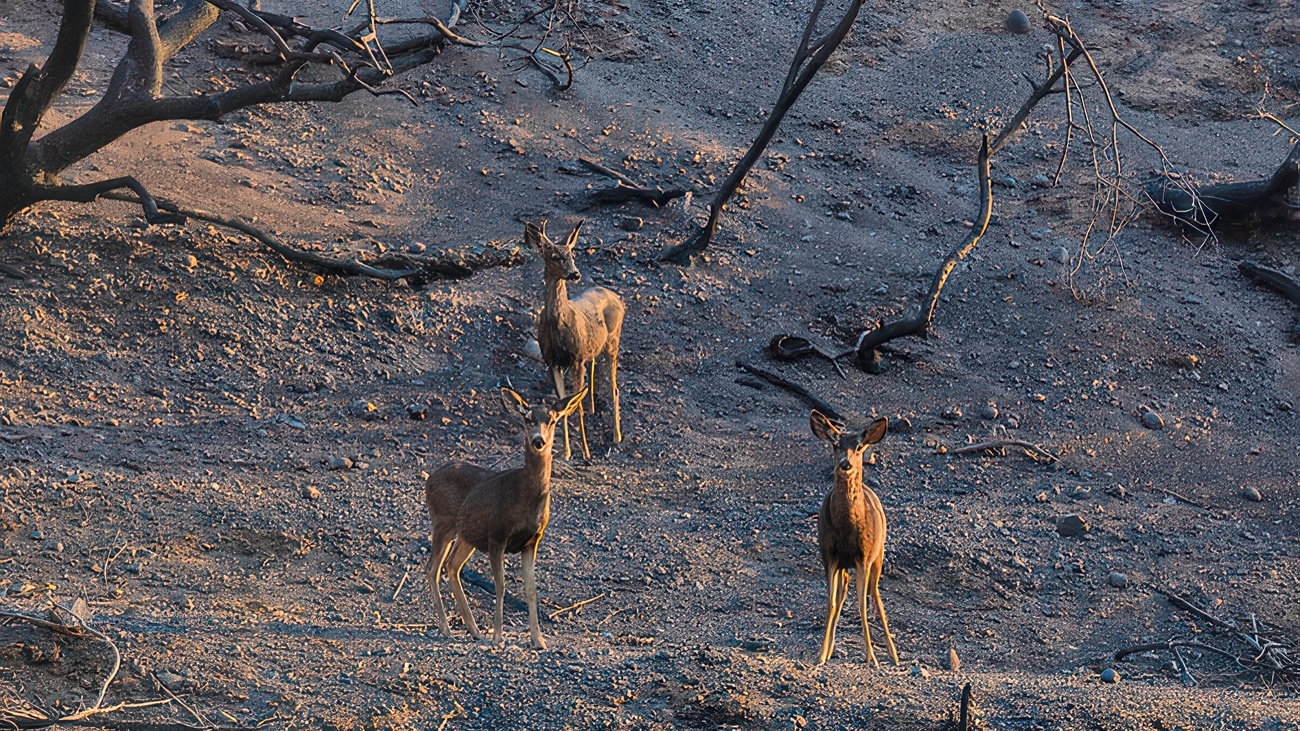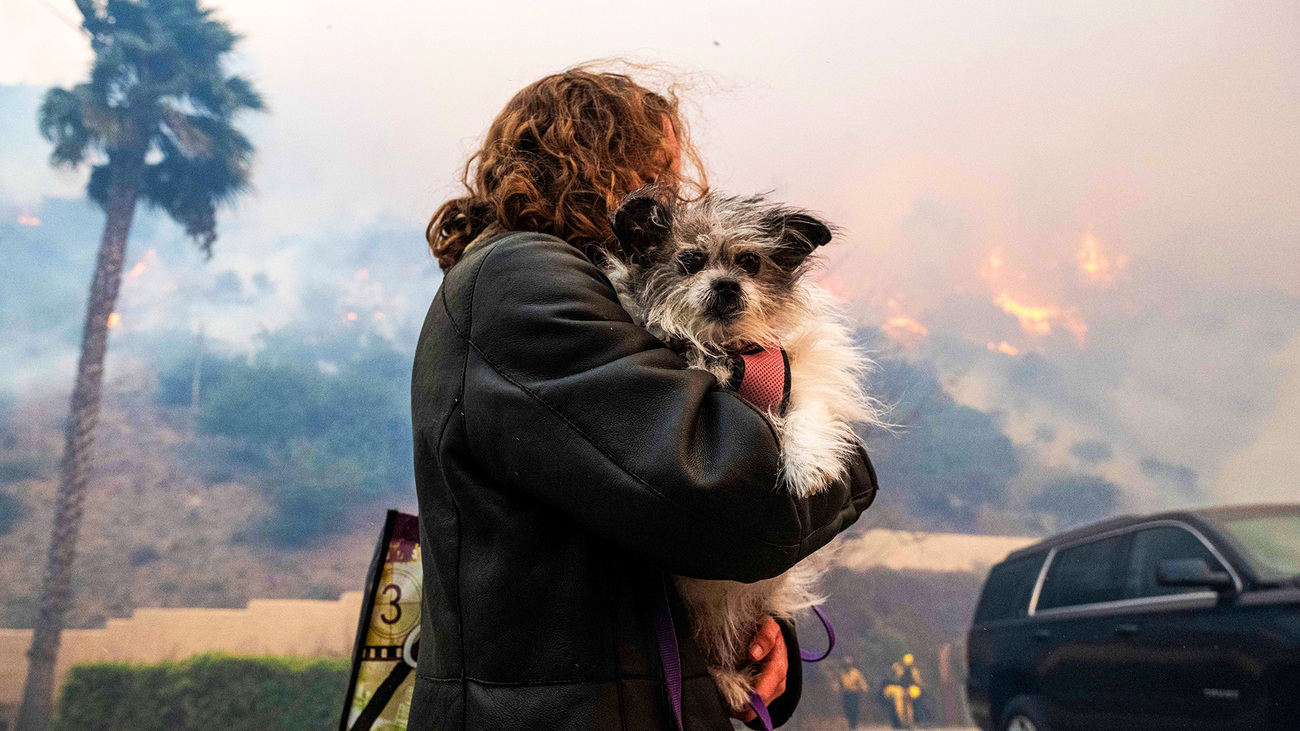Rescuing animals during wildfires – United States
As many as 90% of wildland fires in the US are caused by humansEmergency support for people and animals impacted by Los Angeles wildfires
Emergency support for people and animals impacted by Los Angeles wildfires
IFAW joins animal search and rescue efforts in Los Angeles
January 27, 2025
As southern California continues to recover from the largest wildfires the area has seen, heavy rainfall has brought flooding and mudslides to the area. To meet animal search and rescue (ASAR) needs in the city of Los Angeles, IFAW is sending a team of four responders to lead two teams under the ASPCA’s leadership.
Watch this wonderful reunion story
Our responders will be looking for companion animals in fire-affected areas and evacuation zones throughout the city. This involves going door to door, putting eyes on every standing structure, performing perimeter checks looking for any signs of life, and—due to curfews—setting camera traps to monitor any nighttime movement.

‘We will touch every single address in the city of Los Angeles that was affected,’ said IFAW’s Disaster Response Program Director Shannon Walajtys, who is currently serving as Planning Chief of the Animal Response Management Team for LA Animal Services. Hopefully, with the joint effort of IFAW, ASPCA, and American Humane, we can reunite animals with their families.
In addition to companion animals, we’ve also witnessed the fires’ impact on wildlife. Recently, an injured bobcat came into the care of our partner Pasadena Humane, after a member of the community found him in a bush near Foothill Boulevard in Pasadena. The bobcat had been struck by a car and was in noticeable pain. Though he did not appear to have any burn injuries, wildfires like these can cause wild animals to move into more heavily populated areas, which increases their chances of coming into contact with humans and vehicles.
Pasadena Humane’s veterinary team sedated the bobcat and took x-rays to assess his injuries. The results showed a broken pelvis, but fortunately, his prognosis is positive. He was transferred to California Wildlife Center, another IFAW-supported facility, where he will continue his recovery until he’s ready to be released back to the wild.
Hughes fire erupts near Los Angeles
January 23, 2025
While containment has vastly improved for the Palisades and Eaton fires, a new wildfire has erupted northwest of Los Angeles, near Castaic Lake. Known as the Hughes fire, it has burned more than 10,000 acres in just its first day.
IFAW is now on the ground with the ASPCA to provide animal incident management coordination to the City of Los Angeles. This includes helping the city formulate and carry out plans for rescuing and caring for animals in need, helping to secure in-state resources, and coordinating field teams for assessments—utilising our extensive disaster response expertise.
As our partner Pasadena Humane continues to take in animals, IFAW is supporting them in their care of injured and displaced wildlife. In addition, we are supporting Wetlands and Wildlife Care Center in Huntington Beach.
There is a long road ahead to full recovery. IFAW is prepared to help with the recovery process in any way we are needed.
Injured wildlife need rescue in Los Angeles wildfires
January 17, 2025
The devastating wildfires in Los Angeles County continue to rage, consuming over 37,000 acres and forcing tens of thousands of residents to evacuate. While people flee for safety, the fires are also taking an immeasurable toll on wildlife. Many animals are left injured, displaced, and in urgent need of care as their habitats are consumed by flames.
In this critical time, IFAW is providing an emergency grant to Pasadena Humane, which continues to be a vital lifeline for affected wildlife. Pasadena Humane is accepting injured wildlife, providing triage, and arranging for long-term care with partner organizations when necessary.

At IFAW, we recognize the immense strain placed on local organizations like Pasadena Humane during disasters of this magnitude. Our emergency grant will help cover extra staff time and medical treatments for injured wildlife.
Pasadena Humane’s ability to provide immediate care for injured animals is essential to ensuring the survival and recovery of countless wild animals.
The scale of destruction caused by these wildfires is a stark reminder of the challenges faced by both humans and animals during natural disasters. Together with Pasadena Humane and other partners, IFAW is committed to ensuring that wildlife has a chance to recover and return to their natural habitats once the fires are extinguished.
Stay tuned for updates as the situation evolves.
Rushing to help wildlife affected by California wildfires
January 13, 2025
As wildfires fueled by strong Santa Ana winds rage across Southern California, the impact on animals—both domestic and wild—is devastating. Over 40,000 acres have burned as of 13 January, killing at least 24 people and forcing more than 180,000 people to evacuate. In addition to the challenges faced by people and their pets, countless wild animals are injured, displaced, and in desperate need of care.
To help address this crisis, IFAW is rushing emergency aid to our friends at the Wetlands and Wildlife Care Center (WWCC) in Huntington Beach, CA. With an anticipated influx of wildlife, WWCC urgently needs resources to provide care for these animals. IFAW’s emergency grant will help purchase food for a variety of wildlife species, as well as critical medical supplies to treat burns and other fire-related injuries.

Located farther from active fire zones, Wetlands and Wildlife Care Center doors are open to take in wildlife victims in an effort to alleviate capacity for rescue groups in affected areas, thus ensuring the animals can be cared for safely. The public has also begun bringing injured wildlife directly to WWCC, with the number of incoming patients expected to increase dramatically as burned areas reopen to rescue teams.
The Wetlands and Wildlife Care Center specializes in rehabilitating injured, orphaned, and displaced wildlife, and the current wildfire crisis has placed enormous pressure on their staff and resources. Burn injuries require specialized treatment, including wound care, hydration, and pain management. There are also less obvious impacts, such as smoke inhalation and chemical irritations from the soot. The center’s team is working tirelessly to ensure each animal receives the attention and care they need to recover and, when possible, return to the wild.
IFAW engages network to assist with California wildfire response
January 9, 2025
The devastating wildfires in Los Angeles County this week have taken a toll on both people and animals alike. Since igniting early Tuesday morning, the fires have tragically claimed five human lives, forced tens of thousands to evacuate their homes, and left a path of destruction in their wake. Those affected include countless pets and wildlife that also call Los Angeles home.

While many residents were able to escape with their pets, some animals have been left behind, creating a dire situation for local shelters and rescue organizations. These groups, already burdened by overpopulation, are now working tirelessly to care for the influx of animals in need.
Many of this week’s scenes follow familiar celebrity faces and places we know and love, but the chaos caused by the fires highlights the challenges faced by underserved communities as well, where resources for both people and animals are often scarce.
At IFAW, we are prepared to support those most in need. Ongoing calls with the National Animal Rescue and Sheltering Coalition (NARSC) ensure that we’re able to continuously assess emerging needs. We’ve also reached out to the International Wildlife Rehabilitation Council (IWRC) to offer support to their members working in affected areas.
With decades of experience, IFAW's global responders are expertly equipped to help animals and people in even the direst of emergencies. We stand ready to collaborate with local organizations and municipalities, ensuring that animals and the people who care for them are not forgotten during this crisis and in the long recovery ahead.
Wildfire support resources for Los Angeles County residents and their animals
If you or someone you know has been impacted by the wildfires in Los Angeles County, please find important resources below:
- California Animal Response Emergency Support via CARES Facebook
- California Department of Forestry and Fire Protection / CAL FIRE
- Los Angeles County Emergency Animal Shelter Information: Los Angeles County Fires
- Los Angeles County resource page for residents
- Residents in unincorporated communities can report urgent requests 24/7 by calling 800-675-4357.
- Learn what to pack in your #DisasterReady kit to ensure you and your animals are safe
Related content
Our work can’t get done without you. Please give what you can to help animals thrive.